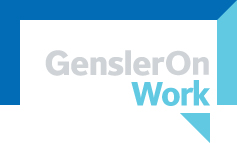Learning Through Practice: Gensler’s Case Study Series
 Sam Coats
Sam Coats Image © Gensler
Here’s the scenario: you’re part of a design team for a 300,000 sq. ft. headquarters facility for an iconic global publishing company. The week before final construction documents are due, the company’s CEO announces plans to add a private executive office to the existing floorplan and hires a private architect to design this addition. Such a drastic change, as well as the inclusion of another architect’s vision at this stage in the design process, will not only push the completion of the construction documents past the deadline but could create additional costs for a project with little wiggle room left in the budget. What do you do? How do you raise these legitimate concerns with the client? What alternatives do you suggest? How might you lead the client and your design-build partners in a rework of the overall strategy?
That’s just one of the scenarios explored in the second volume of Gensler’s Case Study Series. This suite of case studies, based on real world projects, bridges the stark gap between the study of design in academic environments and the practice of design in the real world. It shares Gensler’s applied knowledge and best practices for addressing design challenges, while teaching users to apply principles learned in the classroom to authentic projects scenarios.
Transitioning from the academic world to a professional design firm is often fraught with stress, because too many architecture and design students graduate with little awareness of the unglamorous realities—like budget constraints and messy collaborations—working architects and designers face on a daily basis. The Case Study Series addresses this issue. It augments standard architecture and interiors curricula by showing users how ideas, schemes, and design theory manifest into completed works within the confines of a live business environment.
Image © Gensler
Using the case study method of learning inspired by business school education, which has long used real world examples to instruct students and young professionals in various aspects of business practices, Gensler’s Case Study Series has been included in lecture and small group settings at Tulane School of Architecture, the Boston Architectural College, and other accredited architecture and interior design programs. It has also served as an invaluable resource to young architecture and design professionals, many of whom struggle to find guidance as they navigate the critical early years of their careers.
Each entry in the Case Study Series dovetails with specific topics covered in the AIA’s Architect’s Handbook of Professional Practice. Volume 2 focuses on projects involving multi-purpose base building and corporate interiors. Each individual case study provides background information on budgets, funding, and contractual agreements in order to convey a broad understanding of the overall project. Users are then presented with a set of learning objectives, a detailed project background, a client profile, and profiles on all other key players, before being guided through 10 unique scenarios, each covering a different opportunity or a project-specific challenge. In addition to a series of short video interviews which capture subject matter expert insight on topics covered throughout the case studies.
These tools help prepare students and young designers to enter the profession by illustrating the sort of tangible challenges architects and designers are confronted with while working on complex projects. Users are exposed to scenarios in which a challenge arises during the life of the project, and are asked to draw upon academic lessons, critical-thinking skills, and emotional intelligence to determine possible resolutions.
Image © Gensler
The Wilcott & Brookes Publishing case study is now available for purchase as a downloadable, interactive PDF.
Synopsis: Wilcott & Brookes Publishing is a Gensler interior architecture case study profiling the fast-tracked completion of a 300,000 square foot headquarters for an iconic global publishing company. Working in collaboration with a variety of client stakeholders and a number of consultants, the project was completed on-time and on-budget despite the last-minute inclusion of a significant interior graphics program and a change management offering.
Topics Covered
- Design-Bid-Build Project Delivery
- Interior Architecture
- Consulting Services
- Contracts/Risk Management
- Complex Client Teaming
Image © Gensler
The Portland Institute of Technology case study is now available for purchase as a downloadable, interactive PDF.
Synopsis: Portland Institute of Technology is a Gensler design-build case study profiling the bid for and completion of a 175,000 square foot mixed-use, academic building. Two firms, working in an atypical yet highly productive teaming situation, bid for the project and worked with a variety of client stakeholders to deliver an aesthetically unique and highly functioning campus building on-time and on-budget.
Topics Covered
- Design-Bid-Build Project Delivery
- Contracts/ Risk Management
- Base Building Architecture
- Firm Management
To learn more and purchase case study offerings visit: www.gensler.com/academic-resources. For questions, please contact: Sam Coats, Firmwide Talent Development Manager at sam_coats@gensler.com.
 |
Sam Coats's passions revolve around the intersection between education and people. He delights in seeing personal growth and development in others through lifelong learning. These drivers have informed his career in various roles as architectural designer, non-profit program manager, and talent development advocate. He is the Emerging Talent Manager in Gensler's Global Talent Studio and an AIA Associate. Contact him at sam_coats@gensler.com. |





